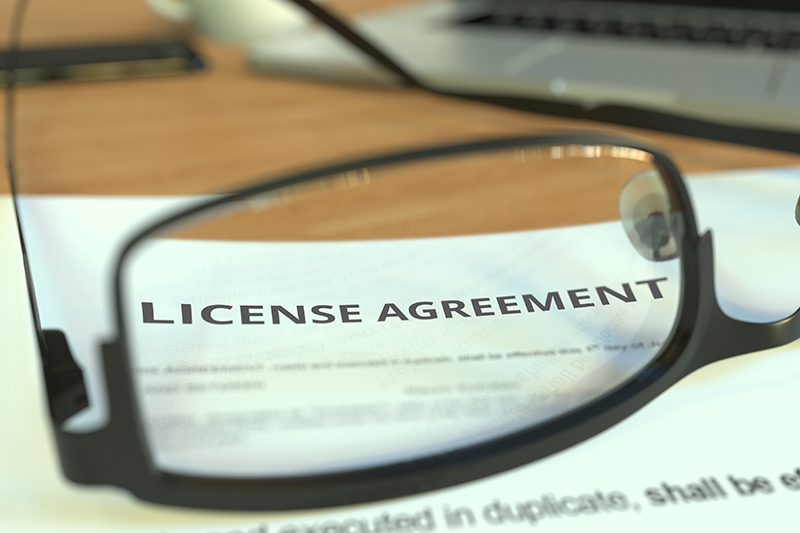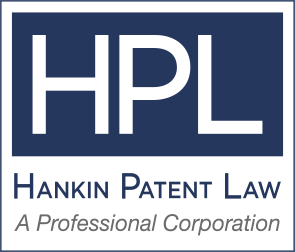License Agreements and Analysis

The Attorneys at Hankin Patent Law, APC have decades of experience with drafting Agreements to protect our Clients’ Intellectual Property rights. There are many kinds of Agreements that may be implemented by the Client, depending on the situation.
What is a Licensing Agreement?
When an individual or company creates some new intellectual property it has the right to protect that invention, slogan, or creation by preventing others from using or profiting from it. Anyone who uses the new intellectual property is liable for infringement, unless first a License has been negotiated to transfer rights and make what would be considered “infringement” into a permitted use.
How Licensing Agreements Work
Licensing Agreements are particularly important to clients in the manufacturing, computer software and home theater industries, and the fashion and jewelry industries. A License Agreement sets forth the rights and obligations of each party: the Licensor and the Licensee. The Attorneys at Hankin Patent Law, APC have negotiated and drafted hundreds of License Agreements on behalf of Licensor and Licensee, and are available to discuss your needs when you are ready to commercialize your invention, branding, or creative works.
License Agreement Components
A License Agreement involves many components that, together, comprise a complete License Agreement. Each of these parts of the License Agreement is independently negotiable and, depending on whether you are Licensor or Licensee, and whether you have a strong negotiating position or a more moderate one, will determine how hard you may push on one or more of the components to obtain a License that is more favorable to your position. Here are the major components of most License Agreements (not only are each of these negotiable, they each are also non-mandatory; that is, a License might, or might not, have each one of these):
EXCLUSIVITY
A License may be “exclusive” or “non-exclusive” depending on whether the owner of the rights wants to permit only one, or more than one, person or entity to practice the intellectual property that is subject to the License. Typically, if the License is “exclusive” then the Licensee will pay more to the Licensor, and also will be able to enforce the intellectual property rights against infringers in the name of the Licensee. In an “non-exclusive” License, normally the Licensor must be the one to file the infringement litigation in the name of the Licensor (although in either situation, it is possible for the Licensor and the Licensee to share the expenses and/or the proceeds, depending on what is written into the License Agreement, if anything).
TERRITORY
The Territory covered by the License is typically the entire United States, but certainly could be only a part of the U.S. Many times a person or entity expresses a desire to do a “World-Wide” License and, while that is often done, in reality there is no such thing. All Patent and Trademark rights are territorial — that is good only for one country per Patent or Trademark, and separate filings are needed in each and every country — territory — to be licensed. Copyrights, generally, are covered by the Berne Convention, so arguably they are “world-wide” but practically that does not always work out so easily. There might be, in any given License, territorial restrictions on who can sell where, and this tends to be more prevalent with Non-Exclusive Licenses, where each Licensee is given exclusive rights to sell in a certain territory (usually a region of the U.S. or the world) but may not sell in any other region of the country or world.
LICENSE FEE
Some licenses require that the Licensee pay an up-front fee (“License Fee”) to obtain a license in the first place. This is typically when the product is particularly desirable, there are multiple non-exclusive licensees, and merely getting a License is a competitive activity. In some cases, that up-front License Fee is credited against Royalties to be earned by sales, and in some cases it is entirely in addition to the actual Royalties earned. Once again, everything is negotiable.
ROYALTIES
Royalties can be either a percentage of the selling price of each unit or a set amount of money per unit sold. Sometimes a particular License might require payment of a set amount, that might — or might not — be based on the actual number of sales of the Licensed product. Typically, Royalties are owed based on the number or amount of sales in a particular period of time, and must be accompanied by a Royalty Report that specifies how many units were sold, at what price, how many returns there have been, and any other factors that might affect the otherwise simple arithmetic of $ x # = amount owed.
GUARANTEED ROYALTIES
Royalties normally are owed when sales are made. That, however, can lead to a situation in which the Licensee locks up the rights to the Licensor’s product, but then does not make any actual sales. To avoid that situation, some Licenses require that the Licensee pay to the Licensor a “Guaranteed Royalty” which is usually a “Guaranteed Minimum Royalty”, that is, that whatever is paid as a “Guaranteed Minimum Royalty” is credited against the actual Royalties that are earned, and any additional earned Royalties must be paid in addition to the “Guaranteed Minimum Royalty.” They might be due monthly, quarterly, or annually, and, again, all of that is negotiable, depending in large part on the relative strength of the negotiating position.
SUB-LICENSES
Each License has an option of permitting the Licensee to “sub-license” or not. In a situation where a Licensee may “sub-license” each License has an option that the Licensor will profit from the individual Sub-Licensee’s sales or only from the Licensee’s aggregate sales. There may or may not be privity of contract between the Licensor and the Sub-Licensee, and there might be requirements, such as territorial restrictions and/or the ability to further Sub-License the Intellectual Property Rights. All of this can — and should — be discussed further with the Attorneys at Hankin Patent Law, APC, who have negotiated and drafted hundreds of Licenses.
Advantages of Having a Licensing Agreement
The advantages of licensing a product are many, including:
- Control who uses the product or process.
- Limit the license on a software product to one user, requiring the payment of a licensing fee on the transfer of the product.
- Limit where and how a product is used. For example, a license on the logo of a professional sports team may limit the type of product on which the logo may appear.
- Field of Use Restrictions can pertain to the specific segment of the industry in which a Licensee may sell products.
How Hankin Patent Law, APC Can Help
At Hankin Patent Law, APC, our intellectual property attorneys have vast experience negotiating and drafting licensing agreements that protect companies’ intellectual property while optimizing revenue. Clients throughout California, across the United States, and around the world use our services because our lawyers are knowledgeable and experienced in all areas of intellectual property and technology licensing, including the use of “shrink-wrap” and “click-wrap” licenses. We have drafted and negotiated hundreds of OEM licenses, patent licenses, trademark licenses, Copyright licenses, and the like.
Hankin Patent Law, APC often finds creative ways to leverage licensing agreements for our clients. In one successful case, we negotiated a multi-country license for trademark rights and franchises for our client. The termination clauses included in the license were so favorable to our licensor-client that, when the licensee breached the licensing agreement, they ended up having to buy out our client on very favorable terms.
If you would like more control over who makes, uses, or sells your product or process and how, where, and for how much it is made, used, or sold, or if you need to obtain rights to use someone else’s intellectual property ownership rights, please contact the attorneys at Hankin Patent Law, APC to conduct a complimentary initial consultation.

